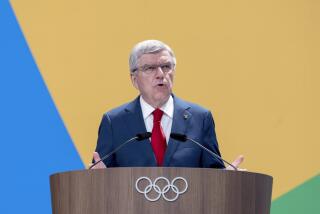U.N. Bans Yugoslav Teams From Olympics : Summer Games: Ruling paves way for individuals to compete in Barcelona.
- Share via
BARCELONA — After five days of deliberation, the United Nations decided Tuesday that its resolution prohibiting sports contacts with Yugoslavia allows individual athletes from that country, but not teams, to compete in the Summer Olympics.
The United Nations “will inform the government of Spain that under no circumstances can (Yugoslav athletes) gather or participate in any kind of team gathering whatsoever,” spokesman Matthew Nerzig said.
The International Olympic Committee’s director general, Francois Carrard, said late Tuesday that he had received no formal communication from the United Nations. But he added that he expects the Spanish government to comply with whatever action is taken by the Security Council’s sanctions committee.
The IOC’s executive board will meet today to formulate a response. It could, however, become irrelevant if the Yugoslav Olympic Committee rejects the United Nations’ terms and decides to send no athletes to the Games, which are to open here Saturday.
“It’s a really difficult decision for the Yugoslav Olympic Committee,” said Slobodan Filipovic, an IOC member from Yugoslavia. “It is good for any athlete to compete in the Olympic Games, but it is also important to think about solidarity.”
But the other IOC member from Yugoslavia, Boris Stankovic, said: “It’s my opinion that if only individual athletes are allowed to compete, Yugoslavia’s Olympic Committee will refuse to take part.”
The Yugoslav Olympic Committee’s secretary general, Caslav Veljic, said from his Belgrade office that he will recommend at a meeting today that such a refusal be made.
“In my opinion, thank you very much for the invitation,” he said. “But to be present without a name, without a country, without a flag, no thank you.”
Of the 118 athletes that Yugoslavia planned to send to Barcelona, 80 are involved in team sports, including water polo, women’s basketball and men’s and women’s team handball. Its men’s basketball team, featuring Laker center Vlade Divac, earlier became a victim of the United Nations sanctions when the Spanish government refused to admit the team for a European qualifying tournament last month.
The prohibition against sports contacts with Yugoslavia, which now consists only of the republics of Serbia and Montenegro, was among sanctions adopted by the Security Council on May 30 in response to the country’s military aggression against a former republic, Bosnia-Herzegovina.
With support from several leading nations, including the United States, the Security Council later accepted an IOC compromise that would have allowed Yugoslav athletes to compete here in white uniforms that did not indicate their nationality and under a neutral flag. They would have represented the Independent Team.
But the Security Council’s 15-member sanctions committee was uncomfortable with the proposal, believing that athletes in team events, including relays in sports such as track and swimming, would be too closely identified with Yugoslavia. Their decision Tuesday even prevents Yugoslav athletes from participating in opening and closing ceremonies.
“No flag, no hymn, no joint appearances,” Nerzig said.
Although there was no official response from the IOC, one member, Vitaly Smirnov of Russia, clearly was unsettled by the United Nations’ role in determining participants in the Olympics.
“I hate having these people dictate to us what to do,” he said.
Nations either were excluded or chose to boycott because of political reasons in each of the last five Summer Olympics, but IOC President Juan Antonio Samaranch had expressed optimism that the Games in his hometown would be universally attended.
That appeared possible when South Africa was readmitted to the movement earlier this year after more than 30 years as a pariah because of its government’s policy of racial separation.
The United Nations’ decision Tuesday does not affect the IOC’s proposal to allow 15-member delegations from Bosnia-Herzegovina and one from another former Yugoslav republic, Macedonia, to participate here. The Bosnians are seeking formal recognition from the IOC, but even if they do not receive it here, they are expected, as are the Macedonians, to accept the IOC offer.
More to Read
Go beyond the scoreboard
Get the latest on L.A.'s teams in the daily Sports Report newsletter.
You may occasionally receive promotional content from the Los Angeles Times.






